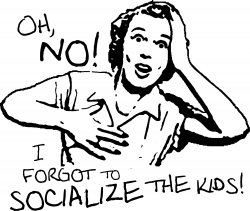 We went to a homeschool gathering today at a local park. It was a raw, chilly, gray kind of day, but I left with a warm glow. It was such a beautiful thing to watch these children of all ages, shapes and sizes come together to socialize.
We went to a homeschool gathering today at a local park. It was a raw, chilly, gray kind of day, but I left with a warm glow. It was such a beautiful thing to watch these children of all ages, shapes and sizes come together to socialize.
“What about socialization?” is such a common question from mainstream society that it’s almost become a bit of a joke among those of us who see homeschooling/unschooling up close and personal. But really, it’s no laughing matter. Socialization is vitally important. Children need to interact with others – many others – in order to develop the kind of strong interpersonal skills that we hope they’ll possess as adults.
But when people ask that age-old question, “what about socialization?” they’re really making an assumption that bears examination. If we were to spell out exactly what was meant by the question, I suspect that it would read something like this: “Without the benefit of spending 6 hours a day in the company of their peers, how can homeschooled children possibly develop social skills?” The assumption here is that spending 6 hours a day in the company of peers actually does accomplish healthy socialization.
But I’m not so sure it does.
I remember my childhood recess days. I recall the cliques, the exclusion, the ridicule and the bullying. Who could ever forget the accursed “cooties” that floated around the playground just looking for a victim to claim? Or the many childhood chants…I know you are, but what am I? I’m rubber, you’re glue, and a dozen others designed to rebound the many insults flung at the otherwise defenseless? What about the seemingly endless moments before you were picked for a team, while you prayed to all that was holy that you please, please, wouldn’t be picked last? Or the “cool” table at lunch? The notes, the tattling, the gossip…sometimes when I look back at those years, I’m amazed I survived with my sanity intact.
I also remember my years of teaching. Sadly, very little had changed from my own school days. Sure, we had a new social skills curriculum and more involved guidance counselors, but in spite of redoubled efforts to quell bullying, it was alive and well right up until I left teaching. The recent television campaign to stamp out bullying would seem to suggest that things haven’t gotten much better in the ten years that have since passed.
Whenever I think about the socialization question, I’m reminded of the classic literary work Lord of the Flies. How can we expect children to learn healthy social skills when they spend so much time at the mercy of those who possess no better skills themselves? To expect that my nine-year old will learn how to be a good, loyal, honest friend from a bunch of other nine-year olds is faulty reasoning. It would be like expecting a first year medical student to learn how to perform an appendectomy by watching a bunch of other first year students give it a go. Doesn’t seem like the best idea, now does it? What medical students actually do is to watch people more experienced than themselves. And then, under their watchful eyes, begin to participate.
Doesn’t this seem like a better model for socialization? Wouldn’t nine-year olds learn more by watching more mature children handle various social situations? Those same nine-year olds, in turn, would model their social skills for the younger children in their circles. Not to mention the benefits of having many adults engaged and immediately available to facilitate problem solving and to act as role models. But this is not possible in classrooms of 2o+ students to one teacher and a heck of a lot of curriculum to cover before the year is out.
Homeschooling is where it is possible. It’s what happens all the time for children who are able to interact in mixed age groups, supported by the adults who love them. And it’s truly amazing to see the social skills they develop as a result.
Right…
Research shows that there are two likely candidates for best teachers for nine-year-olds:
a)parents
and
b)eleven-year-olds
Interesting 🙂 Thanks for sharing.